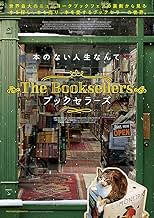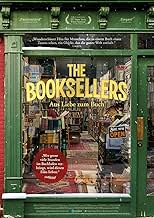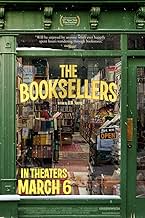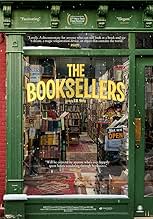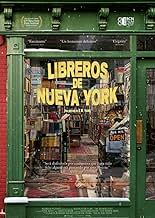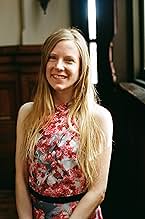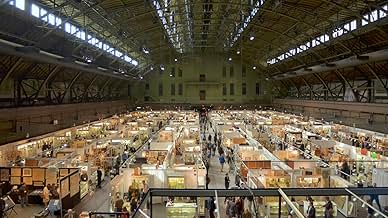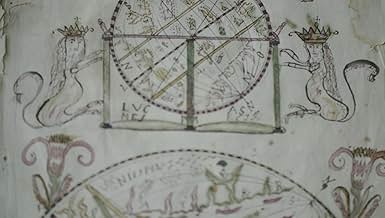The Booksellers
- 2019
- 1h 39m
IMDb RATING
6.9/10
2.3K
YOUR RATING
A behind-the-scenes look at the New York rare book world.A behind-the-scenes look at the New York rare book world.A behind-the-scenes look at the New York rare book world.
Parker Posey
- Self
- (voice)
Featured reviews
One if these documentaries that can be quite fascinating one moment then quite dull the next. So, for me, a mixed bag here.
Gives an inside look at the seldom seen world of antique booksellers and collectors in NYC.. The film also offers a little more optimism about the field being carried on by out younger generation, although the modalities will be most different.
For those viewers that can get through the, at tines, stodginess, the doc does offer some good rewards.
Gives an inside look at the seldom seen world of antique booksellers and collectors in NYC.. The film also offers a little more optimism about the field being carried on by out younger generation, although the modalities will be most different.
For those viewers that can get through the, at tines, stodginess, the doc does offer some good rewards.
Greetings again from the darkness. One might think that the only thing less interesting than watching someone read a book would be watching them talk about a book they are buying and not intending to read. Director-Editor-Producer DW Young somehow manages to make the topic quite engaging ... due in no small part to the stream of bibliophiles and antiquarian booksellers we meet. The philosophy of the film is best expressed through one of the many spot-on quotes sprinkled throughout: "Books are a way of being fully human."
It's either cheating or hedging one's bet when a director secures an interview with the eloquent Fran Lebowitz for a documentary. If the documentary is about books, well that's even better. She perfectly describes the joy in "crawling around" bookstores in search of just the right one. She recalls the days when bookstores lined 4th Avenue, in what had been labeled "Book Row." These days, only one remains - The Strand, which was founded in 1929. We learn that in the 1950's, there were 358 bookstores in New York City, and now your search for a good read is limited to 79. The oldest remaining NYC bookstore is the stunning Argosy on E. 59th, and it's being operated by the three daughters of Louis Cohen who opened the store in 1925. Ownership of the building is key to the bookstore remaining open for nearly 100 years.
Director Young takes us inside the beautiful and historic Park Avenue Armory for the NYC Antiquarian Book Fair. It's here where we see a Fidel Castro doll (I guess everything is collectable!), and more importantly get a feel for how the rare book trade works. These collectors are obsessive about their books and compulsive in their mission of the next rare discovery. We see warehouses, apartments, offices, and stores jam packed with books, and to cap it off, we hear from the folks who have made this their passion. Not just bibliophiles like Ms. Lebowitz, Gay Talese, and Susan Orlean, but the boots-on-the-ground booksellers and collectors. There is even a segment on Martin Stone, the legendary book scout or bookrunner, who was also a rock 'n roll guitarist.
"The internet killed the hunt." A perfect example is given on how the world wide web changed book selling and collecting. In the old days, a collector could spend years assembling a full collection of Edith Wharton books, whereas today, a credit card and an afternoon on the internet would yield the same results. This is 'buying' contrasted with 'collecting', and the old school collectors have either adjusted or are struggling. Even auctions have changed, and Bill Gates' purchasing Leonardo Da Vinci's "The Codex Leicester" via phone ... for $28 million ... is an example.
Movies about book dealers are discussed, including THE BIG SLEEP and UNFAITHFUL, and we see a clip of Larry McMurtry's speech championing book reading and bookstores. It should also be noted that Mr. McMurtry is a long time book seller and collector from Archer City, Texas. One of the industry's new celebrities is the ultra-charming Rebecca Romney, who became famous for her stints on TV's "Pawn Stars" as the resident book expert. Ms. Romney is leading the new wave of collectors, and her passion as a glass-half-full type is contagious.
Author Maurice Sendak said "There's so much more to a book than reading." Here, we learn about the importance of book jackets and special bindings, and how these rare books are actually historical evidence ... artifacts of culture. This explains why 'book burning' has the history it does as both symbolizing and physically accomplishing the destruction of certain segments of society. We also learn those in this business don't think highly of Kindle. The words may be the same, but the experience certainly isn't.
The film is billed as a behind-the-scenes look at the New York rare book world, but it spends more time exploring the folks who make-up this business/industry/lifestyle. Their passion, and one might even call it a fetish, is quite interesting. The argument can be made that their work is quite important in preserving history. Smooth jazz accompanies the story, and it's only fitting that I learned a new word: Incunabulum, which is an early printed book. These collectors express concern about their legacy, so hopefully the film will spur even more people to understand the historical relevance of books in our cultured society.
It's either cheating or hedging one's bet when a director secures an interview with the eloquent Fran Lebowitz for a documentary. If the documentary is about books, well that's even better. She perfectly describes the joy in "crawling around" bookstores in search of just the right one. She recalls the days when bookstores lined 4th Avenue, in what had been labeled "Book Row." These days, only one remains - The Strand, which was founded in 1929. We learn that in the 1950's, there were 358 bookstores in New York City, and now your search for a good read is limited to 79. The oldest remaining NYC bookstore is the stunning Argosy on E. 59th, and it's being operated by the three daughters of Louis Cohen who opened the store in 1925. Ownership of the building is key to the bookstore remaining open for nearly 100 years.
Director Young takes us inside the beautiful and historic Park Avenue Armory for the NYC Antiquarian Book Fair. It's here where we see a Fidel Castro doll (I guess everything is collectable!), and more importantly get a feel for how the rare book trade works. These collectors are obsessive about their books and compulsive in their mission of the next rare discovery. We see warehouses, apartments, offices, and stores jam packed with books, and to cap it off, we hear from the folks who have made this their passion. Not just bibliophiles like Ms. Lebowitz, Gay Talese, and Susan Orlean, but the boots-on-the-ground booksellers and collectors. There is even a segment on Martin Stone, the legendary book scout or bookrunner, who was also a rock 'n roll guitarist.
"The internet killed the hunt." A perfect example is given on how the world wide web changed book selling and collecting. In the old days, a collector could spend years assembling a full collection of Edith Wharton books, whereas today, a credit card and an afternoon on the internet would yield the same results. This is 'buying' contrasted with 'collecting', and the old school collectors have either adjusted or are struggling. Even auctions have changed, and Bill Gates' purchasing Leonardo Da Vinci's "The Codex Leicester" via phone ... for $28 million ... is an example.
Movies about book dealers are discussed, including THE BIG SLEEP and UNFAITHFUL, and we see a clip of Larry McMurtry's speech championing book reading and bookstores. It should also be noted that Mr. McMurtry is a long time book seller and collector from Archer City, Texas. One of the industry's new celebrities is the ultra-charming Rebecca Romney, who became famous for her stints on TV's "Pawn Stars" as the resident book expert. Ms. Romney is leading the new wave of collectors, and her passion as a glass-half-full type is contagious.
Author Maurice Sendak said "There's so much more to a book than reading." Here, we learn about the importance of book jackets and special bindings, and how these rare books are actually historical evidence ... artifacts of culture. This explains why 'book burning' has the history it does as both symbolizing and physically accomplishing the destruction of certain segments of society. We also learn those in this business don't think highly of Kindle. The words may be the same, but the experience certainly isn't.
The film is billed as a behind-the-scenes look at the New York rare book world, but it spends more time exploring the folks who make-up this business/industry/lifestyle. Their passion, and one might even call it a fetish, is quite interesting. The argument can be made that their work is quite important in preserving history. Smooth jazz accompanies the story, and it's only fitting that I learned a new word: Incunabulum, which is an early printed book. These collectors express concern about their legacy, so hopefully the film will spur even more people to understand the historical relevance of books in our cultured society.
The rare book world to some seems like an impenetrable mystery filled with
expensive volumes, well-heeled buyers, and unapproachable and quixotic sellers brimming with disdain for the uninitiated. In fact, it is a very vibrant and welcoming world with a fabulous range of interesting material, many affordable rarities to delight, and down-to-earth dealers that are thrilled with new collectors whose interest they can cultivate. As such, this is a rare and important movie for it opens up that unique world to a broader audience. If you are curious about this movie, your soul already gravitates towards literature and history, but you may not know how easy it is to hold treasures in one's hand and connect on such an intimate level with great authors and events of the past. The movie is a tribute not only to the love affair of the printed word, but to the people who seek it out, catalog it, contextualize it, and make it available to libraries and collectors. The movie also deserves great credit for highlighting women and minorities (among others) and the importance of the growing inclusiveness in the rare book world in terms of collecting and preserving their narratives and helping assemble the first hand material that will help tell many untold stories.
I chanced upon this documentary on Amazon Prime. Because I have quite a large collection of books and have spent much of my life haunting used bookstores, I was intrigued. It was fun to see the passion for the items themselves. All collectors have a bit of an unhealthy connection to whatever they are collecting. But why is the question that is most important. Here we see people who have connections going back generations or those who are contemporary. I enjoyed it, but I have to say that at times it really dragged. Sometimes people can be too philosophical. Still, many questions that have evaded me were answered reasonably well.
The Booksellers (2019) -
This documentary was that sort of crass that you get from America sometimes, full of some very eccentric people, not all from the U. S. However the content still had an appeal about it by the time I made it to the end.
Some of the "Booksellers" looked incredibly familiar, but I couldn't for the life of me work out where I might have known them from, because I've never seen anything else about these people, which lead me to wonder if they might be actors, although IMDB did not back up that theory of course. Perhaps they just have those faces.
The film itself made me wish that the charming old book shops, that so many of the people described, still existed. I remembered the second hand book shop that I used to frequent, which was never going to really succeed, because the guy that owned and ran it spent all day reading instead of stacking or shelving the books in to any sort of orderly system, but it was a place to find treasures and I pray that places like it (Maybe slightly better) might come back in to fashion again.
What I liked about this documentary was that it covered diversity within writing, without screaming about it too much. There were references to authors of colour and of course those within the LGBTQ+ community, because books were a large part of bringing acceptance about and another way to access information on other cultures through stories and so on.
What worried me by the end though was the question of what happens if the internet crashes and all is lost? I don't care how many back ups the world thinks it has, we must keep books alive. Even if they're all just kept in a damp proof and fireproof building to be referred to at special request, because knowledge is so important and so is the art of writing fiction or otherwise. You wouldn't scan Van Gogh's 'Sunflowers' in to a computer and then consider it less important to keep the originals, because it's saved forever in the electric ether!
As a writer, I feel that the internet and access to the written word that way is very important, but I will always put my books out as hard copies, because I believe that there is still something important about having that book to hold and treasure if you do find that you enjoy it. You never know when Netflix will take your favourite show off of their listings and you never know when Kindle might decide that a book isn't worth keeping anymore either. If you have a real copy then you can never be without your favourite adventures or pages of knowledge.
So, overall it was interesting to see how these people worked within the industry, although for some of them it was more about the possession of a book with monetary value and less about the beauty of the words or pictures inside, but in general this film just stirred feelings within me around the creation, publication and continuation of the printed word.
600.17/1000.
This documentary was that sort of crass that you get from America sometimes, full of some very eccentric people, not all from the U. S. However the content still had an appeal about it by the time I made it to the end.
Some of the "Booksellers" looked incredibly familiar, but I couldn't for the life of me work out where I might have known them from, because I've never seen anything else about these people, which lead me to wonder if they might be actors, although IMDB did not back up that theory of course. Perhaps they just have those faces.
The film itself made me wish that the charming old book shops, that so many of the people described, still existed. I remembered the second hand book shop that I used to frequent, which was never going to really succeed, because the guy that owned and ran it spent all day reading instead of stacking or shelving the books in to any sort of orderly system, but it was a place to find treasures and I pray that places like it (Maybe slightly better) might come back in to fashion again.
What I liked about this documentary was that it covered diversity within writing, without screaming about it too much. There were references to authors of colour and of course those within the LGBTQ+ community, because books were a large part of bringing acceptance about and another way to access information on other cultures through stories and so on.
What worried me by the end though was the question of what happens if the internet crashes and all is lost? I don't care how many back ups the world thinks it has, we must keep books alive. Even if they're all just kept in a damp proof and fireproof building to be referred to at special request, because knowledge is so important and so is the art of writing fiction or otherwise. You wouldn't scan Van Gogh's 'Sunflowers' in to a computer and then consider it less important to keep the originals, because it's saved forever in the electric ether!
As a writer, I feel that the internet and access to the written word that way is very important, but I will always put my books out as hard copies, because I believe that there is still something important about having that book to hold and treasure if you do find that you enjoy it. You never know when Netflix will take your favourite show off of their listings and you never know when Kindle might decide that a book isn't worth keeping anymore either. If you have a real copy then you can never be without your favourite adventures or pages of knowledge.
So, overall it was interesting to see how these people worked within the industry, although for some of them it was more about the possession of a book with monetary value and less about the beauty of the words or pictures inside, but in general this film just stirred feelings within me around the creation, publication and continuation of the printed word.
600.17/1000.
Did you know
- Quotes
Fran Lebowitz: You know what they used to call independent bookstores? Bookstores. All bookstores were independent.
- Crazy creditsIn a short closing video segment, Fran Leibowitz describes what happened when she loaned a book to David Bowie.
- ConnectionsFeatures Boudu sauvé des eaux (1932)
- SoundtracksFilm Bop
Written by David Ullmann
Performed by Jp Schlegelmilch, Vincent Sperrazza, Kevin Sun, David Ullmann & Gary Wang
- How long is The Booksellers?Powered by Alexa
Details
Box office
- Gross US & Canada
- $25,694
- Opening weekend US & Canada
- $15,794
- Mar 8, 2020
- Gross worldwide
- $177,306
- Runtime1 hour 39 minutes
- Color
- Aspect ratio
- 1.78 : 1 / (high definition)
Contribute to this page
Suggest an edit or add missing content




